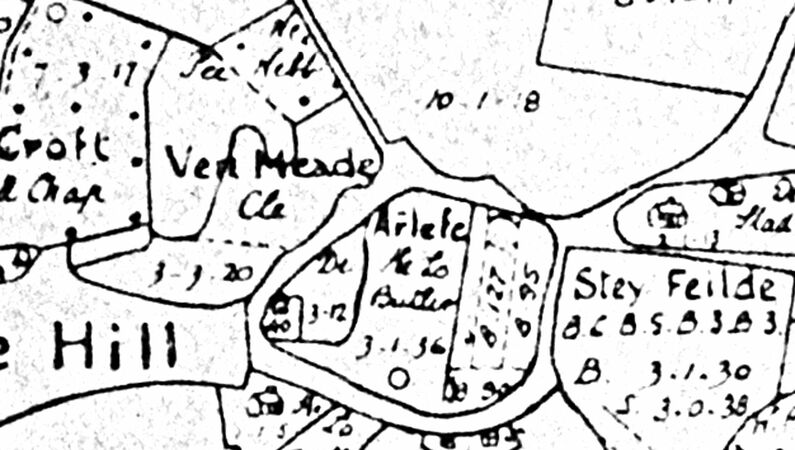Folklore of Ben Cross Bill Cooper August 2018
Bill Cooper wrote about Ben Cross: I was led to believe that a man called Ben was hanged on a tree at the cross roads. I also heard that a member of the Eyles family had a horse that would not pass the tree without being led thereby. An evacuee called John McCullam always recounted the tale from Ben Drew that the horse would never drive past Ben Cross without being led at the bridle. The mystery here is Box folk lore suggesting that a man, presumably called Ben, was hanged here years ago and his spirit remained! Probably just folklore but was there ever a person called Ben?
Ben Cross
The name Ben Cross is that of a house on the road from Box Mill to Ditteridge, before you get to Cheney Court. Nowadays it is an area with a house and cottages. Vicar Tom Selwyn-Smith, who was keenly interested in history, wrote in 1969: Remembering named places in the village … Ben of Ben Cross was a highwayman. You can hear his bones rattling if you go up there on a moonlit night in a high wind. Well that's rather vague and perhaps a little fanciful. These are the historical thoughts we have managed to discover. [1]
The name Ben Cross is that of a house on the road from Box Mill to Ditteridge, before you get to Cheney Court. Nowadays it is an area with a house and cottages. Vicar Tom Selwyn-Smith, who was keenly interested in history, wrote in 1969: Remembering named places in the village … Ben of Ben Cross was a highwayman. You can hear his bones rattling if you go up there on a moonlit night in a high wind. Well that's rather vague and perhaps a little fanciful. These are the historical thoughts we have managed to discover. [1]
The Evidence
Trying to find the origin of place-names was very popular in the 1930s when Alfred Shaw Mellor claimed that Ben was a Devon name for a ridge of grass land. This doesn't help much and derivation analysis has fallen out of favour in modern historical research because it gives only a snapshot of the past, not capable of developing into social or economic themes. But this question from Bill Cooper is curiously fascinating. Was there ever a man called Ben Cross?
The name is very old. The first reference to the word Ben that I have found is in a field named in Francis Allen’s 1630 map, shown above, when it is the name of a different field in Ditteridge called Ven Meade. The Place-names of Wiltshire says, possibly “fen mead”, meaning a water-logged area.[2] But this isn’t the only suggestion for the origin because Alfred Shaw Mellor suggested in 1933 that the word Ben originated in Devonshire meaning A ridge of grass land.[3] So, almost the complete opposite of the low-lying watery area. Neither explanation is convincing for the location of Ben Cross.
There are more recent references to the name in John Ayers History of Ditteridge: The old Ditteridge schoolhouse then became St Christopher's vestry and remained so until a new vestry was built on to the north side of the church in August 1966. The old vestry was then rebuilt as a new Rectory to replace the Rectory House at Ben Cross.[4]
Any other thoughts?
Trying to find the origin of place-names was very popular in the 1930s when Alfred Shaw Mellor claimed that Ben was a Devon name for a ridge of grass land. This doesn't help much and derivation analysis has fallen out of favour in modern historical research because it gives only a snapshot of the past, not capable of developing into social or economic themes. But this question from Bill Cooper is curiously fascinating. Was there ever a man called Ben Cross?
The name is very old. The first reference to the word Ben that I have found is in a field named in Francis Allen’s 1630 map, shown above, when it is the name of a different field in Ditteridge called Ven Meade. The Place-names of Wiltshire says, possibly “fen mead”, meaning a water-logged area.[2] But this isn’t the only suggestion for the origin because Alfred Shaw Mellor suggested in 1933 that the word Ben originated in Devonshire meaning A ridge of grass land.[3] So, almost the complete opposite of the low-lying watery area. Neither explanation is convincing for the location of Ben Cross.
There are more recent references to the name in John Ayers History of Ditteridge: The old Ditteridge schoolhouse then became St Christopher's vestry and remained so until a new vestry was built on to the north side of the church in August 1966. The old vestry was then rebuilt as a new Rectory to replace the Rectory House at Ben Cross.[4]
Any other thoughts?
References
[1] Parish Magazine, April 1969
[2] JEB Gover, Allen Mawer and FM Stenton, The Place-names of Wiltshire, 1970, Cambridge University Press, p.86
[3] Parish Magazine, December 1933
[4] Rev John Ayers, One Bell Sounding: A Brief History of Ditteridge and its Church, 1992
[1] Parish Magazine, April 1969
[2] JEB Gover, Allen Mawer and FM Stenton, The Place-names of Wiltshire, 1970, Cambridge University Press, p.86
[3] Parish Magazine, December 1933
[4] Rev John Ayers, One Bell Sounding: A Brief History of Ditteridge and its Church, 1992
